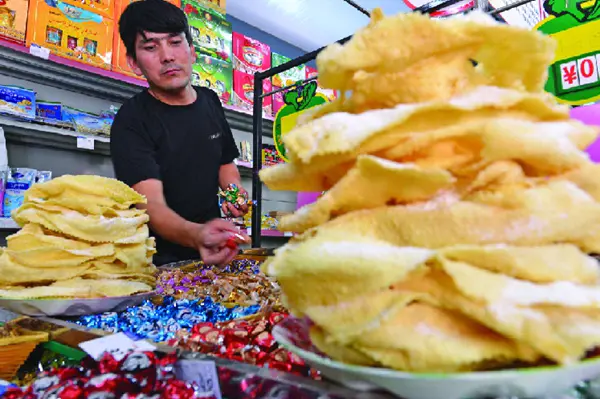Amat Sulaiman did a roaring trade on Tuesday night, as his Nang bread shop in Kashgar, northwest China's Xinjiang, was crowded with locals shopping ahead of Eid al-Fitr, a festival marking the end of the Islamic holy month of Ramadan.
The festival is being widely celebrated in Qinghai, Gansu, Ningxia and Beijing, home to large concentrations of China's 20 million Muslims, on Wednesday, and it is for this day that employees of the shop toiled in scorching heat to make "Nang," a baked pancake and staple for Uygurs in Xinjiang.
Residents select dried fruits and desserts at Kashgar Western and Central Asian Bazaar for International Trade in Kashgar. Xinhua/Bu Duomen
Amat Sulaiman said he sold more than 4,000 Nangs on Tuesday night.
During the days nearing Eid al-Fitr, the shop's Sawut Khari and his three apprentices kneaded up to 500 kg of flour a day to meet peak demand.
In a small workshop, one of them made a paste from dough, and then divided the paste into several balls. Two others flattened the balls and rolled them into flat circles, slightly thicker around the edge, which look like pizzas. The last person used a wooden stamp to print a circle and a five-pointed star on each of them.
Later, the team handed their "pizzas" to Memet Eli, who was responsible for baking them in three preheated pits.
They together brushed salt water on the Nang and sprayed water on the surface inside the pit to prevent any sticking. Then came the most challenging job -- Memet Eli put the Nangs into the hot pit one by one.
In the process of baking, the key is the amount of charcoal and the burning degree of the charcoal at the bottom of the pit. It is believed charcoal can give Nang a special scent.
Memet Eli can control the temperature of the pit, but he can't change the temperature outside. July is one of the hottest month of the year in Kashgar. On Tuesday, the temperature outside was over 30 degrees Celsius and the temperature near the Nang pit was over 50.
He had to break from his work frequently to cool his head with water. "It is hot, extremely hot," he said.
A man takes baked nang, a kind of crusty pancake, staple food of the Kashgar people. Xinhua/Bu Duomen
During Ramadan, Muslims abstain from all food, drink and other physical needs during daylight hours. But for Memet Eli, he said he is not able to fast due to the hard work. "It would lead to heat stroke," he said.
Sawut Khari kept on fasting during Ramadan, and therefore his partners let him do the "easier" work of making dough.
As Kashgar has entered peak tourist season in July, the workers provide bite-size Nang samples to invite curious visitors to have a taste.
Kashgar received 1.14 million tourists and reaped tourism revenues of 650 million yuan (97 million U.S. dollars) in the first half of 2016, up 38 percent and 23 percent year on year respectively, according to the local tourism bureau.
(APD)
 简体中文
简体中文

